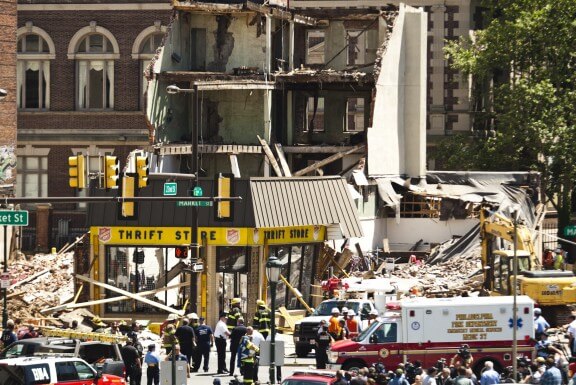If you had to assign the Streets Department response to potholesan A-through-F grade, how would it score?
“D,” said one South Philadelphia woman. “It feels like the street is caving in.”
Her friend, who lives at 18th and Dickinson,agreed with the score: “Down in South Philly, there are potholes everywhere.”
“Girl, if it doesn’t get fixed by winter, we’re in trouble,” her friend replied.
During a City Council hearing Wednesday, thedepartment gave itself an A-minus.
Since January, the Streets Department has filled more than 27,000 potholes, and is bracing for the winter season. But the division is dogged by its reputation.
Expressing dissatisfaction with the department’s last several years of hole-filling, the Committee on Streets and Services convened yesterday totackle the city’s perennial pothole problem, and is considering measures to fix it. Councilman David Oh has proposed a spray-injection unit, which takes just one person to operate and three minutes to fix a pothole.
From 2006 to 2012, Philadelphia contracted with Bucks County-based Patch Management, whose PK2000 (short for “Pothole Killer”) gets the job done safely and efficiently. But company officials who testified before the council committee said they lost the contract three years ago to a lower bidder who met requirements that were added that year. City spokesman Mike Dunn counters that Patch met the new requirements, but lost the bid on cost and performance.
Last year,NBC10 uncovered corruptedrecord-keepingat the department. Reviewing reports, the news station found nearly 300 potholes across the city that had been listed as “closed” in one day, many in the same minute. Acting Streets Commissioner Michael Carroll said at the time, “they’re clearly not [accurate]. We didn’t do that volume of potholes all over the city in one day.” Dunn said that Carroll was wrong about the volume of potholes repaired in a single day. City crews do repair 300 potholes in a day, he said. The commissioner has apologized to workers for his misstatement, Dunn said. Oh cited the NBC 10 investigation when questioning Chief Highway Engineer Steve Lorenz, who explainedthe public often misidentifies cave-ins and ditches for potholes, which leads to a slow response time from the department. A guide on the Streets Department’s websiteexplains:potholes are “bowl-shaped openings up to 10 inches deep. They occur when the top layer of the road has worn away, exposing the concrete base.” Oh then asked, “If you were to grade the condition of Philadelphia’s roads compared to other cities and towns, and our ability to respond to repairing these potholes and deficiencies, would you give us an A, B, C D, E or F?” “It’s difficult to answer your question,”Lorenz said, explaining that PennDOT, SEPTA and Streets all share responsibility for maintenance and repair for city roads.
“Sometimes the people who drive don’t understand all the nuance, between state highway or city street,”Councilman Al Taubenberger said. “They just know there’s a damn hole there and they want it fixed.”
City searches for concrete answers to Philly’s pothole problem

Charles Mostoller































